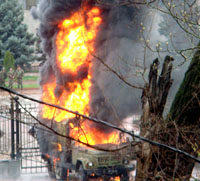
Imperial Overkill and the Death of U.S. Empire
Source: Foreign Policy in Focus
The oft-cited reference to Afghanistan as the “graveyard of empires” haunts the increasingly desperate military measures of the United States in that beleaguered country. However, beyond Afghanistan and the hydrocarbon-rich Caspian basin region, the imperial projects of the United States are, more and more, a commitment to Pentagon aggression and profligacy. Imperial overstretch has transmogrified into imperial overkill.
While all empires have had to contend with imperial overstretch, the particular historical situation confronting the United States after the fall of the Soviet Union led to an asymmetrical hyper-power, reliant especially on the reach of the Pentagon. The compulsion to rely even more heavily on the military to compensate for a waning hegemony in other domains — and to contend with shrinking resources (especially hydrocarbons), rising adversaries (especially China) and growing resistance (especially non-state Islamic militants and Latin American national-popular governments) — led to a record number of direct U. S. interventions. In turn, two of the most massive interventions, those in Iraq and Afghanistan, underscored the inability of Washington to realize all of its imperial goals.



